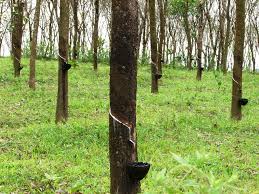rubber
英 [ˈrʌb.ər]
美 [ˈrʌb.ɚ]
- n. 橡胶;橡皮;合成橡胶;按摩师
- adj. 橡胶制成的
- vt. 涂橡胶于;用橡胶制造
- vi. 扭转脖子看;好奇地引颈而望
- n. (Rubber)人名;(西)鲁韦尔
使用频率:

中文词源
rubber 橡皮,橡胶
来自 rub,刮,擦,-er,表物。
英语词源
- rubber (n.)
- "thing that rubs" (a brush, cloth, etc.), 1530s, agent noun from rub (v.). The meaning "elastic substance from tropical plants" (short for India rubber) first recorded 1788, introduced to Europe 1744 by Charles Marie de la Condamine, so called because it originally was used as an eraser.
Very useful for erasing the strokes of black lead pencils, and is popularly called rubber, and lead-eater. [entry for Caoutchouc in Howard, "New Royal Encyclopedia," 1788]
Meaning "overshoe made of rubber" is 1842, American English; slang sense of "condom" is by 1930s. Sense of "deciding match" in a game or contest is 1590s, of unknown signification, and perhaps an entirely separate word. Rubber stamp (n.) is from 1881; figurative sense of "institution whose power is formal but not real" is from 1919; the verb in this sense is from 1934. Rubber cement is attested from 1856 (from 1823 as India-rubber cement). Rubber check (one that "bounces") is from 1927.
权威例句
- 1. Rubber bullets were used to break up the demonstration.
- 橡皮子弹被用来驱散示威人群。
- 2. The accident was caused by people slowing down to rubber-neck.
- 事故是由为了看热闹而减速的人引起的。
- 3. Wear rubber gloves while chopping chillies as they can irritate the skin.
- 切辣椒时要戴橡胶手套,因为辣椒会刺激皮肤。
- 4. Seven people were wounded when soldiers fired rubber bullets to disperse crowds.
- 士兵发射橡皮子弹驱散人群时有7个人受了伤。
- 5. The lad was wearing rubber-soled shoes.
- 这个小伙子穿着橡胶底的鞋子。